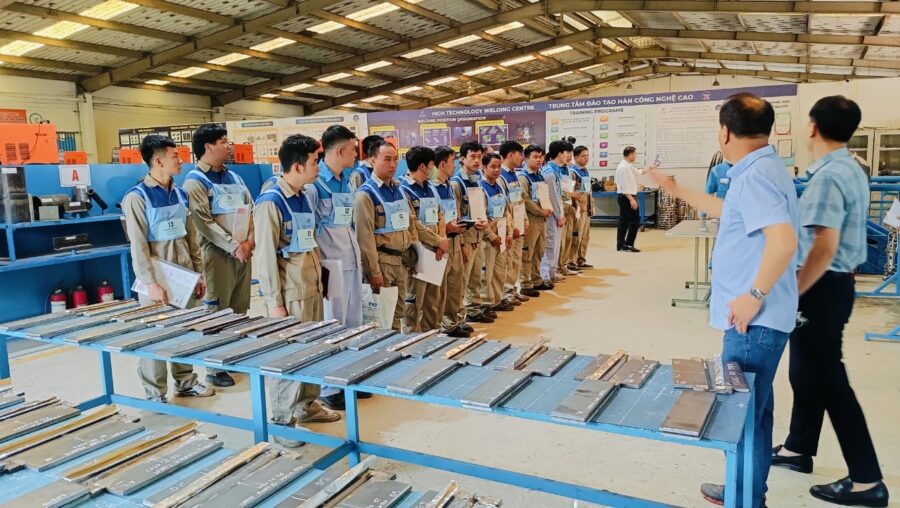
In today’s rapidly expanding industrial landscape, global contractors face a common challenge: local shortages of certified welding professionals. From shipyards in South Korea to infrastructure projects in Poland and refinery overhauls in the Middle East, demand is growing, but reliable manpower is scarce. As a result, many companies are now sourcing their welding talent from Vietnam. Behind this successful labour flow is a key driver — the welding staffing agency Vietnam companies rely on for technical accuracy, legal compliance, and project continuity.
Vietnam’s Welding Agencies: From Labour Brokers to Workforce Architects
Vietnamese welding staffing agencies have evolved far beyond their original role. They no longer simply match workers to jobs. Today, they act as talent architects who translate foreign project needs into local training pipelines. Their role spans technical recruitment, certification validation, legal processing, and post-deployment performance support.
A skilled agency doesn’t stop at fulfilling requests. It begins by analysing the job’s technical demands: joint design, welding position, material type, or compliance standards. From there, it designs testing protocols that match those criteria. It also verifies documentation and aligns domestic skills with international codes. These agencies build real-time databases that track every welder’s profile, including certifications, past projects, and availability. The result? Clients receive workforce solutions that minimise risk and maximise performance.
Why Vietnam Produces Technically-Ready Welders
Vietnam’s vocational training ecosystem plays a central role in developing certified welders. The government has invested in polytechnic education, and many schools now partner with international employers. These institutions offer multi-year programs in core welding methods — MIG, TIG, SMAW, and FCAW.
Trainees spend hundreds of hours practising on modern equipment that mimics industrial conditions. They learn quality assurance, weld inspection methods, and code-based welding. By graduation, many already qualify for global certifications like ISO 9606 or AWS D1.1. Testing often involves oversight by foreign-certified assessors to ensure international compatibility.
Vietnam’s welding workforce is not just technically sound — it’s also trained in soft skills. Trainees learn safety discipline, workplace hierarchy, and how to interact with multicultural teams. This dual focus on hard and soft skills explains why so many employers see high performance and low dropout rates from Vietnamese welders.
How Agencies Structure the Recruitment Pipeline
A professional welding staffing agency in Vietnam follows a multi-phase process to meet international requirements. First, it reviews job specs sent by clients. These may include pipe diameter, weld type, thickness, or working conditions. Based on this, the agency selects candidates from its internal pool.
Each candidate must then pass a trade test tailored to the job. For example, someone bound for a Japanese shipyard might perform FCAW welds in vertical positions on 12 mm plates. The agency records this process and sends the results — including inspector notes and video documentation — to the client for validation.
At this stage, agencies also assess behaviour and communication. Workers must understand safety commands, respond to team leaders, and follow site protocols. The goal is not just to test hands-on skills, but also to ensure workers fit the rhythm of the client’s jobsite.
Scaling with Quality: Vietnam’s Talent Pipeline Advantage
Vietnam’s welding staffing model can scale without sacrificing quality. Leading agencies manage their workforce like a production pipeline. New trainees enter the first phase — classroom learning and hands-on training. The second phase includes trade testing and certification. Those who pass enter the third: visa processing and job matching.
This structured system allows for fast responses to bulk hiring needs. When a refinery needs 60 certified welders in six weeks, agencies can activate backup talent, run trade test weekends, and coordinate staggered departures. This scaling happens with minimal error because the pipeline is pre-managed.
Agencies also handle logistics — visa paperwork, consulate scheduling, and travel planning. On arrival, most workers require little additional training, reducing downtime. That’s why many employers treat Vietnam’s welding pipeline not as a backup plan, but as a core staffing strategy.
The Economics of Vietnamese Welding Labour
Many companies turn to Vietnam for its competitive labour costs, but the financial advantage extends further. Agencies deliver welders who arrive job-ready. This means less time spent on training, fewer site accidents, and lower rework rates.
Vietnamese welders also tend to stay longer. Agencies prepare them with realistic expectations, legal briefings, and basic language skills. This results in lower turnover and more project continuity. Some agencies even offer replacement guarantees, loyalty bonuses, or performance monitoring services.
In practice, this efficiency lowers overall costs, even beyond wages. Companies save on onboarding, insurance claims, and production delays. The return on investment becomes clear over the full project lifecycle.
Managing Legal and Compliance Complexity
International labour deployment brings legal risk. Agencies in Vietnam manage this by ensuring full compliance. They prepare bilingual contracts, labour ministry clearances, and destination-country work permits. Most contracts go through embassy validation, which helps avoid disputes later.
Professional agencies also provide insurance coverage, health screenings, and pre-departure orientation. Workers learn about grievance channels, legal protections, and job site expectations. This preparation leads to smoother integration, better retention, and fewer HR issues onsite.
In long-term projects, agencies continue providing support. They assign local representatives to visit workers, check on productivity, and provide updates to the client. When needed, they coordinate rotations, replacements, or repatriation, ensuring stability throughout the contract term.
A Long-Term Strategic Asset for Global Industry
Vietnamese welders are not just short-term fixes for labour gaps. When recruited properly, they become long-term contributors to high-performance teams. Global contractors increasingly rely on Vietnam not just for cost efficiency, but for quality, compliance, and adaptability.
The key to unlocking this potential lies in choosing the right welding staffing agency in Vietnam. A strong partner ensures alignment between project needs and candidate skills. It provides process transparency, manages legal risk, and delivers a workforce that performs from day one.
As global industry demands speed, safety, and technical precision, Vietnam Manpower Welder offers a reliable labour solution — not just through its welders, but through the agencies that prepare and support them.